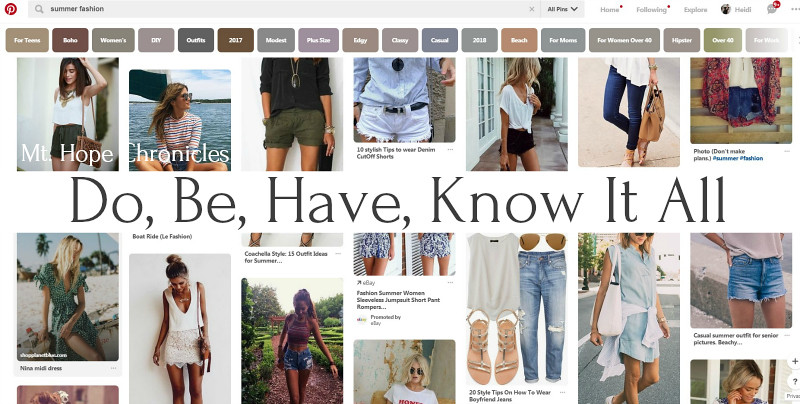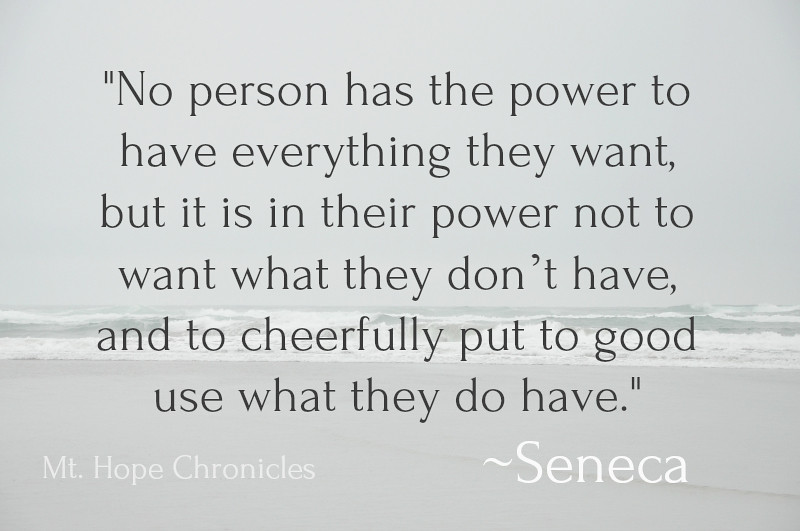
Today’s contemplation of libery and limits is a long one. If you haven’t read the previous posts, you may want to start here and then read chapter two.
Quite some time ago, I read The New Midlife Crisis at Oprah.com. It’s long. And relevant.
Let me sum it up for you.
We (women in particular) have been sold a lie:
“You can have it all, and having it all will make you happy.”
At some point after that lie began, the ugly truth hit us.
“You are obligated to have it all, and you will be judged accordingly. You will always fall short.”
You must do it all, be it all, have it all, know it all. Everything is available to you so no excuses.
Options became obligations became oppression, and now we’re coming undone under the weight of it all.
You have 20 local gyms. You have countless excercise programs on countless platforms to stream to your television. Heck, stream them on your i-whatever, so you never have an excuse. Any time. Any place. Any weather. You must always be thin and sculpted.
You have a gazillion anti-aging products and procedures to choose from. You are expected not to age.
You have a gazillion beauty products to choose from, and a salon around every corner. You should look like you just stepped out of one.
Bronzed skin in February? Check. Precisely straight, unnaturally glow-in-the-dark white teeth? Required.
You can have any career you wish. It had better be impressive.
All the stuff? All the activities and vactions? That’s what credit cards, loans, and mortgages are for. No excuses.
Maybe, just maybe, we can shrug off the expectations. We can make a different choice for ourselves, self-limit, despite real or perceived judgment. But add kids to the equation? Mothers, in many cases, take a lion’s share of the child-raising obligations on their shoulders. Can we handle the judgment of others (including our kids) when we don’t provide or facilitate every possible opportunity for our children?
Speaking of children… No one has an excuse not to have children. And no one has an excuse to have more than two. Boy and girl, preferrably. Hair combed. Clothes clean. Top of their class. Leader of the team. All the activities. Best schools.
And, by golly, now that you have everything, you should be happy. Because we all know that independence, money, beauty, things, and success bring happiness, right?
A little over a month ago, I randomly stumbled on this raw-honest article written by Stacy London of What Not To Wear fame.
It’s worth reading, but I’ll sum it up for you.
Independence, money, beauty, things, and success don’t bring happiness.
Days before I read that article, Joshua Gibbs posted the following on Facebook:
"Money cannot buy happiness, but it can buy unhappiness."
One day prior, also on Facebook, a friend posted quotes from Homo Deus by Yuval Noah Harari.
“In 2012 about 56 million people died throughout the world; 620,000 of them died due to human violence. In contrast, 800,000 committed suicide, and 1.5 million died of diabetes. Sugar is now more dangerous than gunpowder."
"For all humanity’s astounding accomplishments in reducing the worst sufferings, our happiness levels really haven’t changed. Actually suicide is a greater problem, especially in developed countries."
I immediately grabbed Homo Deus at the library, and I’m riveted. For all of human history, we have battled three dominant problems: famine, plague, and war. Harari makes the case that we humans, in just the past few decades and for the first time in history, have transformed these “uncontrollable forces of nature into manageable challenges.” Now that human striving has conquered these dominant problems, we have a new agenda which includes immortality and happiness.
On immortality:
“In truth they will actually be a-mortal, rather than immortal… So as long as no bomb shreds them to pieces or no truck runs them over, they could go on living indefinitely. Which will probably make them the most anxious people in history. We mortals daily take chances with our lives because we know they are going to end anyhow. So we go on treks in the Himalayas, swim in the sea, and do many other dangerous things like crossing the street or eating out. But if you believe you can live forever, you would be crazy to gamble on infinity like that.”
On happiness:
“On the psychological level, happiness depends on expectations rather than objective conditions. We don’t become satisfied by leading a peaceful and prosperous existence. Rather, we become satisfied when reality matches our expectations. The bad news is that as conditions improve, expectations balloon. Dramatic improvements in conditions, as humankind has experienced in recent decades, translate into greater expectations rather than greater contentment. If we don’t do something about this, our future achievements too might leave us as dissatisfied as ever.”
Anxious and dissatisfied. Not progress.
I’m only about 50 pages in, and the book is littered with sticky tabs. I’m curious to read his conclusions. I may have to purchase this one so I can highlight and underline to my heart’s content.
Then another friend (on FB) posted a quote from Reasons to Stay Alive by Matt Haig.
“The world is increasingly designed to depress us. Happiness isn’t very good for the economy. If we were happy with what we had, why would we need more? How do you sell and antiaging moisturizer? You make someone worry about aging. How do you get people to vote for a political party? You make them worry about immigration. How do you get them to buy insurance? By making them worry about everything. How do you get them to have plastic surgery? By highlighting their physical flaws. How do you get them to watch a TV show? By making them worry about missing out. How do you get them to buy a new smartphone? By making them feel like they are being left behind.
“To be calm becomes a kind of revolutionary act. To be happy with your own nonupgraded existence. To be comfortable with our messy, human selves, would not be good for business.”
I immediately purchased (ha!) Matt Haig’s book. It’s an overwhelmingly helpful and, in the end, hopeful book about depression and anxiety from someone experienced with both.
Just today, yet another friend posted this jaw-dropping article: “Torches of Freedom”: The Anti-Literature of Advertising at Front Porch Republic.
“The object is to associate the sandwich with “freedom.” The technique is always the same: associate some salable commodity with some ineffable quality, preferably something deeply felt and visceral: love, peace, attractiveness, status. We cannot purchase freedom by the pound, but we can purchase sandwiches and cigarettes, and if the one can be associated with the other in our minds, it is not necessary to discuss the advantages of the product. After all, you can choose your own vegetables and select one of a dozen pre-packaged dressings. What more could freedom want?”
What more could freedom want? Exactly. All those choices and we think they bring happiness.
“This “new man” created by consumer culture can have anything he wants, except happiness; he must always be wanting and never be content, because contentment would be the death of consumerism. He must always seek his happiness in things rather than in persons, and then seek it again in some other thing; but he must never be allowed to become content; contentment would destroy the consumer culture...”
What’s to be done?
“Teachers of literature must train their students to apply the same techniques of literary criticism they learn in reading literature to their reading of anti-literature… “
[Go read the rest of the article!]
I have a few ideas that I’ll be sharing in later posts, but I’ll share two counter-cultural links.
:: Just as I Am: Accepting Our Limitations by Jennifer Hesse (Jenn is a friend of mine and she posted this as a response to the Oprah article.)
“Whereas human nature constrains our time, energy, and strength, God by his nature is eternal, infinite, and all-powerful.”
:: The Economy of Kindness at Rabbit Room
"The Kingdom of Christ and its economy of grace run deeper. When we offer the token of kindness to others, especially when they expect an exchange of money, we let them know that they have verged upon another land. Here, their money can buy nothing, but if they offer their need, they can dine on the richest of fare."


2 comments:
I only made it half way through, and I'm headed to the Amazon Cart. And I can only digest this a bit at at time. Wow. just wow. (actually about 1/3 way through.) Thanks for posting...
I really enjoyed all of these chapters!! We absolutely live in a world of extremes and are constantly viewing others "high standards" on social media. A very close friend of mine and me are constantly in talks about how everyone (especially the current homeschool world) is trying to sell their "own brand of medicine." Haha! Also, I read your about me - I'm also a ISFJ :) so hello, hello there!
Post a Comment